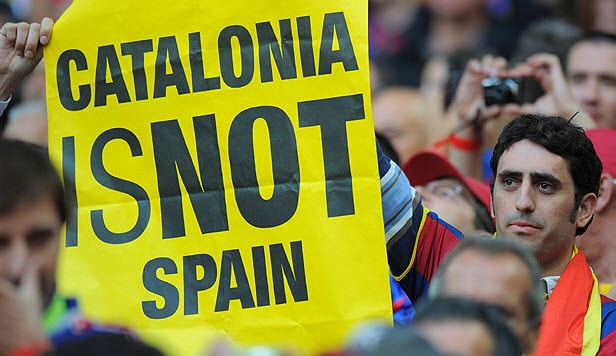Spain's 'scar' that is hard to heal
(Baonghean) - Tensions and divisions have once again risen in Spanish society as the Catalan government announced that it would approve plans to hold a referendum on October 1 regarding its separation from Spain. Despite its firm rejection, the Spanish government is facing a major challenge in healing the "scar" that cannot be healed.
Binding referendum
Since 2014, the Spanish government has used all sorts of measures, from “soft” to “hard” to prevent a secession in Catalonia. The central government has granted Catalonia a higher level of autonomy, enjoying more administrative autonomy, and on the other hand, has been tough on those who initiated the referendums, typically the trial of former Catalan leader Artur Mas for civil disobedience related to the independence referendum in 2014.
But the fight for greater autonomy and even full independence from Spain for Catalonia has not died down. A referendum on independence for the region is scheduled for October 1.
 |
| Catalan people protest to separate from Spain. Photo: El Pais |
Unlike the largely symbolic referendum held nearly three years ago, the Catalan government wants this time to be a binding referendum on secession from the Spanish central government. Current opinion polls show that about half of Catalonia's population prefers independence, and nearly 75% of those questioned support holding a referendum.
The question is why do many Catalans support and nurture the idea of secession when this region is enjoying a high level of autonomy?
With a population of 7.5 million and a dynamic economy on the Mediterranean coast, Catalonia is one of the most developed regions in Spain. Catalonia has its own language and culture and has long wanted to become an independent state.
However, the wave of separatism has really exploded in recent years. The main driver of this wave is the impact of the prolonged economic recession. The people of Catalonia feel that the budget is not commensurate with the tax contributions and that the region has to share the debt with the weakest regions of Spain while contributing the most to the central budget.
Many Catalans believe they can build a somewhat successful economy after independence from Spain and even grow, given how the Spanish government has managed the economic downturn since 2008.
Will it work?
According to the Spanish Constitution, Catalonia cannot decide to secede. That means the central government will never recognize the results of the referendum as legally binding. It seems that this time, Prime Minister Mariano Rajoy's government is determined to prevent such a referendum. In a press conference earlier this week, Mr. Rajoy reaffirmed his commitment to not allowing the independence referendum on October 1 to take place.
 |
| Catalan President Carles Puigdemont (right) called for a referendum on October 1. Photo: Reuters |
According to observers, even if Catalonia could hold such a referendum, the possibility of “secession” is difficult to say. In Spain, the Constitutional Court has legal tools, and the central government has political and financial tools to prevent Catalonia from seceding.
In addition, the results of public opinion polls show that the number of people supporting and opposing secession is at the threshold of 50-50. Although the results of the vote in 2014 showed that up to 80% of the people agreed with the independence plan for Catalonia, it does not mean that at this time, that number is preserved.
Following last month’s terrorist attack in Barcelona, many Spanish government officials have issued the message that “Without Spain, Catalonia is not safe.” That statement has somewhat impacted the psychology of many Catalans in the context of increasingly unpredictable security and terrorist threats.
However, all changes are unpredictable. Two years ago, no one could have imagined that one day Britain would leave the European Union or that Marine Le Pen could reach the second round of the French presidential election. But then everything became reality and so who knows, maybe one day Catalonia could become independent?
The crack widened.
Regardless of whether the upcoming referendum takes place or not and whatever the outcome, Spain’s political “fissures” are likely to widen further. Politically, the opposition has long criticized Prime Minister Rajoy for not “quieting” Catalonia’s secessionist intentions. Publicly, Prime Minister Mariano Rajoy faces a greater challenge in appeasing the rest of Spain, to avoid similar independence intentions as Catalonia.
According to observers, if Catalonia fails to hold a referendum this October, they will not give up their long-cherished intention. That also means the root cause of the secession cannot be completely resolved.
If Prime Minister Rajoy’s government rejects the referendum, it may have to opt for the opposition Socialist Party’s “third way” approach, which involves constitutional reform to give Catalonia more power and make Spain more federal. All of these measures put the Madrid government in a difficult position.
Once Catalonia insists on independence and gains independence, it will not only be a “disaster” for Spain but also for Europe. More worryingly, if the secessionist trend prevails, it will directly affect the security and common prosperity of the EU. Therefore, the fate of Catalonia is not only a difficult problem for the Land of Bulls but also a concern for the whole of Europe in the context that this continent is already “headache” with the Brexit story.
Thanh Huyen
| RELATED NEWS |
|---|

.png)






